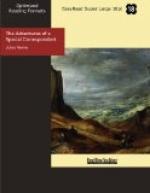It goes without saying that my newspaper would not have sent me to Russia, if I could not speak fluently in Russian, English and German. To require a newspaper man to know the few thousand languages which are used to express thought in the five parts of the world would be too much; but with the three languages above named, and French added, one can go far across the two continents. It is true, there is Turkish of which I had picked up a few phrases, and there is Chinese of which I did not understand a single word. But I had no fear of remaining dumb in Turkestan and the Celestial Empire. There would be interpreters on the road, and I did not expect to lose a detail of my run on the Grand Transasiatic. I knew how to see, and see I would. Why should I hide it from myself? I am one of those who think that everything here below can serve as copy for a newspaper man; that the earth, the moon, the sky, the universe were only made as fitting subjects for newspaper articles, and that my pen was in no fear of a holiday on the road.
Before starting off round Tiflis let us have done with this passport business. Fortunately I had no need for a “poderojnaia,” which was formerly indispensable to whoever traveled in Russia. That was in the time of the couriers, of the post horses, and thanks to its powers that official exeat cleared away all difficulties, assured the most rapid relays, the most amiable civilities from the postilions, the greatest rapidity of transport, and that to such a pitch that a well-recommended traveler could traverse in eight days five hours the two thousand seven hundred versts which separate Tiflis from Petersburg. But what difficulties there were in procuring that passport!
A mere permission to move about would do for to-day, a certificate attesting in a certain way that you are not a murderer or even a political criminal, that you are what is called an honest man, in a civilized country. Thanks to the assistance I received from our consul at Tiflis, I was soon all in due order with the Muscovite authorities.
It was an affair of two hours and two roubles. I then devoted myself entirely, eyes, ears, legs, to the exploration of the Georgian capital, without taking a guide, for guides are a horror to me. It is true that I should have been capable of guiding no matter what stranger, through the mazes of this capital which I had so carefully studied beforehand. That is a natural gift.
Here is what I recognized as I wandered about haphazard: first, there was the “douma,” which is the town hall, where the “golova,” or mayor, resides; if you had done me the honor to accompany me, I would have taken you to the promenade of Krasnoia-Gora on the left bank of the Koura, the Champs Elysees of the place, something like the Tivoli of Copenhagen, or the fair of the Belleville boulevard with its “Katchelis,” delightful seesaws, the artfully managed undulations of which will make you seasick. And everywhere amid the confusion of market booths, the women in holiday costume, moving about with faces uncovered, both Georgians and Armenians, thereby showing that they are Christians.




